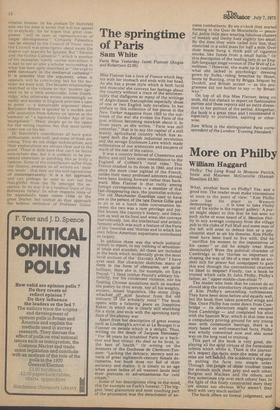The springtime of Paris
Sam White
Paris Was Yesterday Janet Flanner (Angus and Robertson £2.95) Miss Flan ner has a love of France which begins with her stomach and ends with her head. As she has _a prose style which is both lucid and muscular she conveys her feelings about the country without a trace of the sentimentality that disfigures so many of the writings of Anglo-Saxon francophiles especially those of one or two English lady novelists. In her Preface to this collection of her pieces in the New Yorker magazine from 1925 to the outbreak of the war she evokes the Paris of the past without becoming mawkish about it. In those years, as she writes, " Paris was still yesterday," that is to say the capital of a still mainly agricultural country which has escaped both the British industrial revolution and the savage Enclosure Laws which made millionaires of our aristocrats and paupers of much of the rest of the nation.
It was a country beloved of Chesterton and Belloc and still bore some resemblance to the England of Cobbett's ' rural rides.' This France crashed to its doom in 1940, and ever since the more clear sighted of the French, unlike their many professed admirers abroad, have been looking forward rather than backward. Miss Flanner is that rarity among foreign correspondents — a member of that fast-disappearing race, the journalist-scholar. The old Manchester Guardian used to have one in the person of the late Darsie Gillie and to sit in on a lunch table conversation between the two was a rare privilege and joy. She knows the country's history, and literature as well as its food and wine; she conveys marvellously, too, the intellectual and artistic ferment which was such a feature of the Paris of the 'twenties and 'thirties and to which her own fellow-American expatriates contributed so largely,
In addition there was the whole political tumult to report, to say nothing of sensational trials and scandals. All these are included in the book which incidentally gives the most lucid account of the ' Stavisky Affair' I have ever read. Her character sketches, many of them in the form of obituaries, are quite brilliant. Here she is, for example, on Ezra Pound: "I liked neither Pound's arbitary historicity, nor his condensed violence, nor his floating Chinese quotations such as marked the poetry he then wrote, nor all his weighty, ancient, mixed linguistics, like stony chips whacked off. with hauteur from the old statuary 17 -the scholarly mind," The book opens with a faltering piece on Josephine Baker, in which she is clearly still searching for a style, and ends with the agonising early days of the phoney war.
Apart from her description of great events such as Lindbergh's arrival at Le Bourget it is Flanner on people which is a delight. Thus, writing on the death of Jacques Hennessy: " For 89 years he inhabited Paris as a bachelor and bon viveur. He died as he lived, in the best of health." Or writing on the memoirs of the Duchesse de Clermont-Tonnere: "Lacking the delicacy, secrecy and reverie of great eighteenth-century female documents, her book does not fail of their accuracy and malice. It is timely to an age when great ladies of all western lands lend their portraits to advertisements for cold cream."
Some of her descriptions cling to the mind, this for example on Foch's funeral: "The big gest, least glamorous and most touching part of the procession was the detachment of an
ciens combattants, By six o'clock they started forming in the Quai de Montebello — peaceful, polite little men wearing fabulous clusters of medals and Derby hats slightly too small. By the time they were called into line, they stretched in a solid mass for half a mile. Over their heads hung a thick pall of cigarette smoke, like fumes from a small battle." Or this description of the leading lady in an English-language stage version of The Well of Lo. neliness: "However, she made up in costume what she lacked in psychology: dressing gown by Sulka,riding breeches by Hoare, boots by Bunting, crop by Briggs, briquet by Dunhill, and British accent — as the programme did not bother to say — by Broadway."
On top of all this Miss Flanner, being no snob, did not disdain to report on fashionable parties and these reports add an extra dimension to her portrait of the period. Altogether, the book is a great treat and I recommend it especially to journalists, aspiring or otherwise.
Sam White is the distinguished Paris correspondent of the London Evening Standard.'












































 Previous page
Previous page